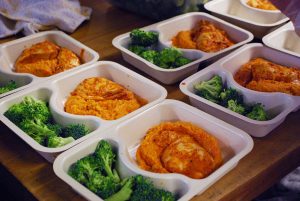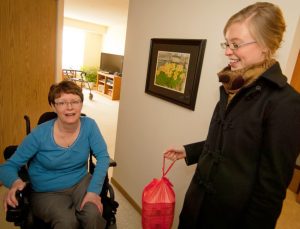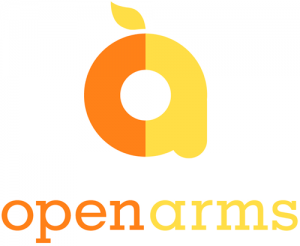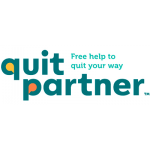Leah Herbert Welles, Executive Director
“Open Arms has helped me with my food disparity so much! I would not have been able to make it through cancer without them.”
—Ellen, a client living with cancer

At Open Arms of Minnesota, we cook and deliver free, medically tailored meals to our Twin Cities neighbors living with life-threatening illnesses. These clients include cancer patients—as well as their caregivers and dependents—who are of course among the most vulnerable during the COVID-19 pandemic. While we typically deliver more than 600,000 meals each year with a volunteer force of over 7,500, we are now on pace to deliver more meals with less overall volunteers this year due to COVID-19.
The good news is that, despite the pandemic’s impact on nearly every facet of what we do, there is still NO waiting list for our meal services. Because we operate from a place of abundance, we are not only continuing our meal services to our clients uninterrupted, but also keeping up with the astonishing 25% increase in demand since the outbreak.
Being able to meet this demand has required that we continually adapt to these uncertain times—from hosting livestream cooking events to reconfiguring our volunteer relationships—but the health and safety of our cancer clients remain top priority. We have taken extra steps to ensure all cancer patients are protected and continue receiving meals. Here are some of the changes we’ve implemented:
- Volunteer delivery drivers are asked to remain outside our building while staffers bring them client meals for delivery. While on delivery, they are required to wear masks and sanitize frequently. To address social-distancing rules, they call clients before knocking on the door, then follow additional measures to ensure safe distancing.
- We have dramatically boosted our sanitation measures inside and outside our building, are following social-distancing rules, and are continually educating ourselves on best practices to prevent spread.
- Due to the unpredictability of the pandemic, our kitchen staff is working to get ahead in production so we have extra meals to deliver. We have also sent additional bags of emergency shelf-stable food to clients and aim to do more as needed.
More information on how we’ve adapted to COVID-19 can be found here.
 While COVID-19 has instigated many changes here, what hasn’t changed is our mission: we believe that food is medicine, and that the right food can make a critical difference in the health of our clients. This is why we have actively expanded our staff of Registered Dietitians, who guide our trained chefs in developing healthy, delicious menu items tailored to specific illnesses. And, aside from optional services and programs like nutrition education/counseling and cooking classes, all clients receive a tailored nutritional assessment as part of their intake. While cancer patients will receive meals based on a combination of recommendations and preferences (the typical once-weekly deliveries include five entrees, a sandwich, several soups, salads, milk, cereal, five pieces of fresh fruit and other snacks, as well as fresh bread and desserts from the Open Arms bakery), they also have the option of adding nausea packs to their deliveries, which include menu items like ginger, gelatin, and tea.
While COVID-19 has instigated many changes here, what hasn’t changed is our mission: we believe that food is medicine, and that the right food can make a critical difference in the health of our clients. This is why we have actively expanded our staff of Registered Dietitians, who guide our trained chefs in developing healthy, delicious menu items tailored to specific illnesses. And, aside from optional services and programs like nutrition education/counseling and cooking classes, all clients receive a tailored nutritional assessment as part of their intake. While cancer patients will receive meals based on a combination of recommendations and preferences (the typical once-weekly deliveries include five entrees, a sandwich, several soups, salads, milk, cereal, five pieces of fresh fruit and other snacks, as well as fresh bread and desserts from the Open Arms bakery), they also have the option of adding nausea packs to their deliveries, which include menu items like ginger, gelatin, and tea.
Additionally, our Client Services team has over 40 years of collective experience providing services to high-risk clients like cancer patients. They are all trained in HIPAA compliance and receive ongoing professional development opportunities. We also launched a Client Advisory Committee in 2019, which we view as a vital way to ensure clients are participating in the creation and evaluation of programming at Open Arms. On top of all this, staff members make as-needed referrals to additional resources, such as social workers, medical services, housing, transportation, and financial assistance.
“I want to thank you very much for your help to Open Arms. The weekly meals are greatly appreciated. My form of cancer gets me tired all the time and short of breath. If I had to cook, I would probably skip many meals doing myself and my body no good. […] I could not live with this cancer without your help.”
—a client living with cancer




